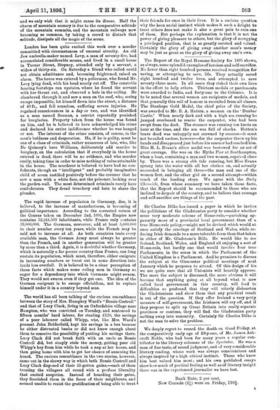The Report of the Royal Humane Society for 1895 shows,
as always, some splendid examples of heroism and self-sacrifice. No fewer than eight hundred persona received recognition for saving, or attempting to save, life. They actually saved eight hundred and twelve lives, and attempted to save seventy-three more. In all oases they risked their own livea in the effort to help others. Thirteen medals or parohments were awarded to India, and forty-one to the Colonies. It is to be noted that several women are recipients of medals, and that generally this roll of honour is recruited from all classes. The Stanhope Gold Medal, the chief prize of the Society, was awarded to Mr. E. A. Hatton, a seaman on the Dunbar Castle.' When nearly dark and with a high sea running he jumped overboard to rescue the carpenter, who had been swept from the deck. The steamer was running ten knots an hour at the time, and the sea was full of sharks. Hatton's brave deed was unhappily not crowned by success—it must not be called useless, however—for the carpenter threw up his hands and disappeared just before his rescuer had reached him. Miss M. L. Evans's silver medal was bestowed for an act of great courage. She was on the Hythe Pier at Southampton, when a boat, containing a man and two women, capsized close by. There was a strong ebb tide running, but Miss Evans sprang into the water with all her clothes on, and actually succeeded in bringing all three—the man and one of the women first, and the other girl on a second attempt—within reach of the landing steps. We agree with the Daily Chronicle, from whose summary we have taken these facts, that the Report should be recommended to those who are inclined to despair of the country, and to believe that courage and self-sacrifice are things of the past.


































 Previous page
Previous page